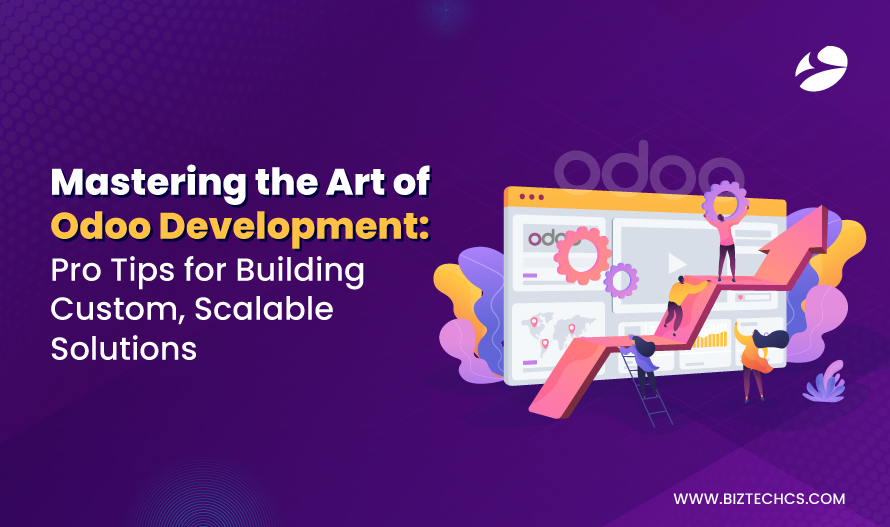1831
Mastering the Art of Odoo Development Pro Tips for Building Custom, Scalable Solutions
29 Oct, 2024
5 min read
1831
29 Oct, 2024
5 min read
Table of Content

Odoo development offers a unique way to create custom solutions for businesses. Mastering this platform can significantly enhance your project’s efficiency. To succeed, you need practical tips and insights tailored for Odoo.
This blog will guide you through essential strategies for building scalable applications. We’ll cover best practices for coding and design that improve performance.
You’ll learn how to leverage Odoo’s powerful features effectively. We’ll also explore common pitfalls to avoid during development. By the end, you’ll be better equipped to tackle Odoo projects confidently.
In advanced Odoo development, creating custom modules requires a clear understanding of the directory structure.
Each module must include a “__manifest__.py” file that defines its metadata and dependencies. To effectively extend existing models, you should choose between single-table inheritance (STI) and multi-table inheritance (MTI).
Knowing when to use field types like Many2one, One2many, and Many2many is essential for building relationships between models. This structured approach enhances code organization and improves module functionality.
Advanced ORM techniques in Odoo can greatly enhance application performance and usability.
Using the “search_read()” method is key for optimized data retrieval. It combines searching and reading records in a single call, reducing database load.
Mastering domain filters allows developers to filter records efficiently, helping to limit the data returned and speed up queries.
Another valuable technique is implementing computed fields. This automates calculations based on other fields, streamlining data management and enhancing user experience.
By leveraging these methods, developers can create more efficient and responsive Odoo applications.
In advanced Odoo development, creating custom views using XML allows for tailored user interfaces that meet specific business needs.
Different view types, such as forms, trees, and kanban, provide various ways to display data effectively.
Widgets like calendars and many2many_tags enhance user experience by making data interaction more intuitive and engaging.
Custom actions and menu items improve navigation, helping users access features quickly and efficiently. Together, these techniques create a more functional and user-friendly application, boosting productivity and satisfaction.
In advanced Odoo development, implementing record rules is crucial for controlling access to specific records based on user roles. This technique ensures that users can only see and interact with data relevant to their responsibilities.
Access Control Lists (ACLs) further refine this by defining what actions users can perform on various models, such as read, write, create, or delete. Group management allows developers to organize users into specific groups, making managing permissions and access rights easier.
Together, these techniques create a secure environment where data integrity is maintained while providing appropriate user access.
In advanced Odoo development, mastering QWeb templates is essential for creating dynamic HTML views.
QWeb allows developers to build responsive user interfaces using a flexible templating engine. By understanding how to inherit templates, you can easily customize existing views without rewriting code.
Additionally, creating custom controllers enables you to handle HTTP requests and serve tailored web pages, enhancing user experience.
Lastly, developing RESTful services using Odoo’s built-in controllers allows for smooth integration with external systems, making your applications more versatile and connected.
Odoo is an open-source enterprise resource planning (ERP) framework. It combines various business applications into one platform.
Users can manage sales, inventory, accounting, and more from a single interface. Odoo uses a modular approach, which means businesses can add or remove applications as needed.
The framework is highly customizable, and developers can create new modules to fit specific needs.
Odoo also supports multi-language and multi-currency features. It has a user-friendly interface that simplifies tasks. Overall, Odoo helps businesses streamline operations and improve efficiency.
To master Odoo development, several resources can help you learn effectively. The official Odoo documentation is essential for understanding the framework’s features.
Online courses on platforms like Udemy or Coursera offer structured learning paths. The Odoo community forums are great for asking questions and sharing knowledge with other developers.
YouTube has many tutorials that cover various aspects of Odoo development, from basic to advanced topics.
GitHub repositories provide real-world examples and code samples to study. Lastly, joining local Odoo meetups or conferences can help you network with other developers and gain insights.
In conclusion, mastering Odoo development requires practice and a clear understanding of its framework. Focus on modular design to create scalable solutions that can grow with your business.
Utilize built-in tools and libraries to save time and enhance functionality. Testing is crucial; always validate your code before deployment. Keep learning and stay updated with the latest features and best practices. Collaboration with other developers or choosing to hire Odoo developers can also spark new ideas and solutions.
If you are looking for Odoo developers, we have a team of skilled professionals ready to help you. Our experts can build custom solutions tailored to your specific needs.
To become an advanced Odoo developer, you need strong programming skills, particularly in Python, as Odoo is built on this language. Understanding the Odoo framework, modules, and APIs is also crucial for effective development and customization.
Best practices for Odoo development include following the MVC (Model-View-Controller) architecture for clean code structure. Additionally, using version control systems like Git helps in tracking changes and collaborating efficiently.
Automated testing in Odoo involves writing tests to check the functionality of modules and features before deployment. It is important because it helps catch bugs early, ensuring a more stable and reliable system for users.
Common issues during Odoo development include module incompatibility and performance problems. To troubleshoot these, check the logs for errors, ensure dependencies are met, and optimize database queries for better speed.
Businesses should consider advanced Odoo development techniques to leverage the platform’s full potential and tailor it to specific needs. These techniques can enhance functionality, improve user experience, and ultimately drive better business outcomes.

Artificial Intelligence (AI)
458
By Devik Gondaliya
25 Apr, 2025

Artificial Intelligence (AI)
6748
By Devik Gondaliya
22 Apr, 2025

Storyblok
40492
By Devik Gondaliya
02 Apr, 2025